Open Air Museum: Murter Views
Promo - February 13, 2023 - The Development Agency of Šibenik-Knin County has established the open-air museum "Murter Views" on the island of Murter.
Murter, that unusual jewel bathed in the sea, decorated with numerous islands, bound by karst, and blessed by the resilience of its people, has been building its history for thousands of years. The continuity of the island's population can be traced from prehistoric times, when the sovereign rulers of the Adriatic, Liburni, built their port city of Colentum on this site, through the period of the Antiquity, when Colentum was settled by the Romans, until today.
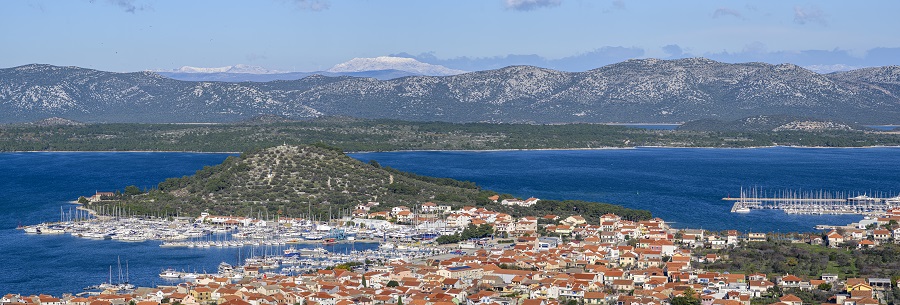
With the aim of promoting and preserving the archaeological, natural, and traditional heritage of the Adriatic macro-region, as well as to promote green and slow tourism based on tradition, local agriculture, gastronomy, and lifestyle, the Development Agency of Šibenik-Knin County has chosen a pilot area on the island of Murter to establish the open-air museum called “Murter Views”.

"This project places a special emphasis on the revitalization of sites that are rich in culture and history but are lesser-known destinations and less touristic areas. We want to breathe life into such places, valorise them and make them more attractive for visitors during the whole and not only the higher season. In this way, we encourage the dispersal of visitors within the island and beyond and thus combat the seasonality“, said Mira Lepur, director of the Development Agency of Šibenik-Knin County.
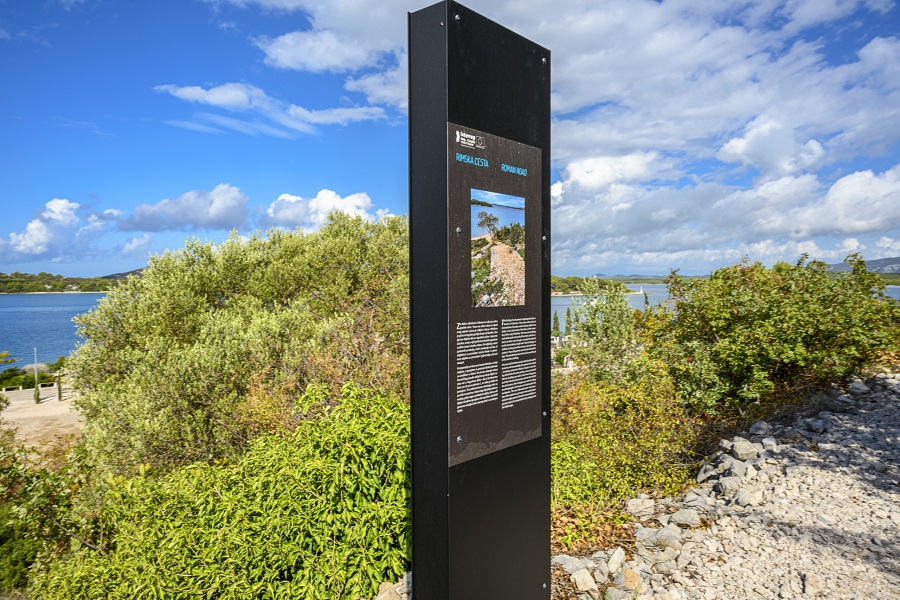
By establishing the open-air museum "Murter Views", we want to tell the story about the vulture and history of the island and invite visitors interested in cultural heritage, in general, to pay a visit to these parts of the region and learn more about local people, places and traditions.
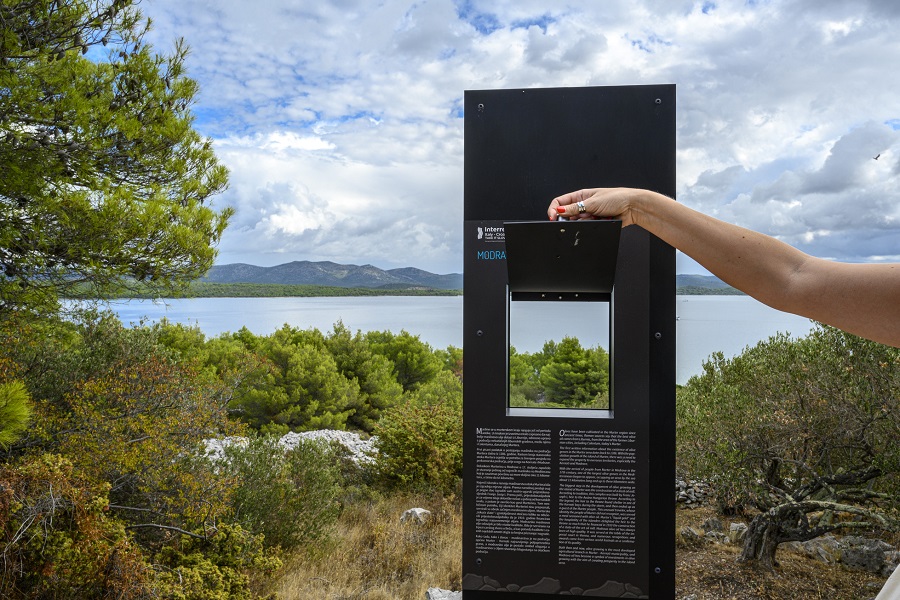
The "Murter Views" open-air museum is located on the Gradina peninsula near the two-hundred-meter-long archaeological beach and the former ancient city of Colentum, which flourished in the 1st century AD during the reign of the Roman emperors Nero and Vespasian.
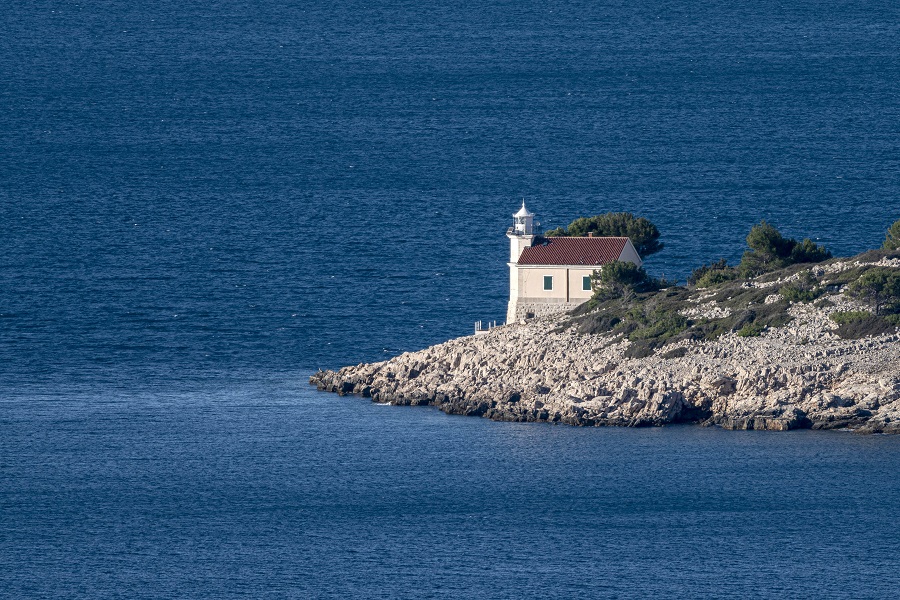
The open-air museum has interpretive signposts and totems and together with the archaeological beach nearby, it forms a unique site on the island that combines historical, archaeological, oceanographic aspects and offers visitors cultural, sports, and recreational facilities.
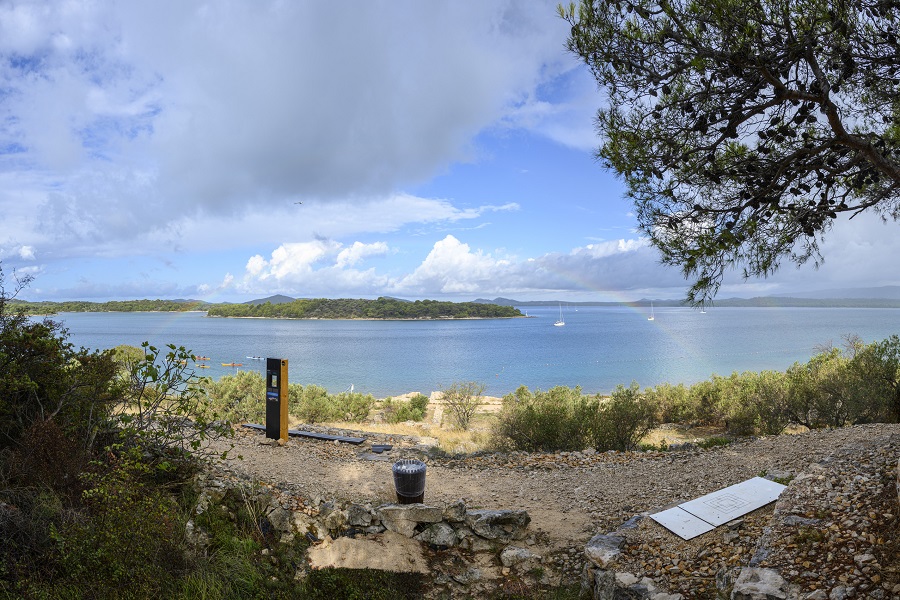
An excellent destination for all visitors who, in addition to beautiful nature, can now enjoy cultural and historical content as well.
“Smart and Slow Tourism Supporting Adriatic Heritage for Tomorrow” (TAKE IT SLOW) is an over 3,7-million-euro worth strategic tourism project co-financed (85%) by the European Regional Development Fund through the Italy – Croatia Cross Border Cooperation Programme. The lead partner is Dubrovnik Neretva Region, while the project partners are Public Institution for Coordination and Development of Split Dalmatia County RERA, Public institution Development Agency of Šibenik-Knin County, University of Zadar, Region of Istria, PROMOTURISMOFVG, Veneto Region, SVEM - Sviluppo Europa Marche Srl, Molise Region, Apulian Theatre – Regional Consortium for Arts and Culture, Emilia-Romagna Region, Abruzzo Region, and Puglia Region. The project is designed to manage and promote the Adriatic Region as a green, smart, sustainable, accessible and slow cross-border tourist destination.“
Learn more about the TAKE IT SLOW project at:
Web: https://www.italy-croatia.eu/web/take-it-slow
Facebook: https://www.facebook.com/takeitslowproject/
Instagram: https://www.instagram.com/takeitslowproject/
Twitter: https://twitter.com/takeitslowadria
YouTube: https://www.youtube.com/channel/UC_zafmSNyXbnerSDddb2SIw
Looking for a Job in Croatia? This Week's Top 10 from Posao.hr (February 12, 2023)
Febuary 12, 2023 - Looking for a job in Croatia? A new weekly feature on TCN, in partnership with leading job site agency, Posao.hr, who present a selection of weekly job listings.
How hard is it to find a job in Croatia, and what is on offer?
We spoke to Ines Bokan, director of leading jobs site Posao.hr, who kindly took the time for this excellent interview overview.
This week's top 10 jobs from Posao.hr:
Adecco Croatia Limited Liability Company is hiring a Business Development Manager (m/f). Remote work and flexible working hours. Send complete applications via link by Feb 16th.
Intra Lighting d.o.o. is hiring a person in the position Lighting designer (m/f). Place of work Zagreb. We offer participation in professional seminars in Croatia and abroad. Send complete applications via link by March 4th.
EMBL European Molecular Biology Laboratory is hiring a person for the position of IT Support Engineer (m/f). Place of work Heidelberg, Germany.we offer you the opportunity to work with the latest technology, being exposed to a fast-growing big data environment operating over 350 petabytes of scientific data and high-end computing across multiple centers to support science at EMBL. Send complete applications via link by March 9th.
Kempinski Hotel Adriatic (Skiper hoteli d.o.o.) is hiring a IT coordinator (m/f). Place of work Savudrija (Umag) - Croatia. We offer incentive income and additional bonuses for work. Send complete applications via link by March 1st.
Marina Punat Grupa d.o.o. is hiring a person in the position of IT Administrator / Computer System Technician (m/f). Place of work Punat. The possibility of personal and professional development. Send complete applications via link until Feb 24th.
Pfizer Inc is hiring a person for the position of Medical Affairs Scientist Croatia (m/f). Place of work Zagreb. Send complete applications via link by March 3th.
Skiper Hoteli d.o.o. is hiring a person in the position of IT coordinator (m/f). Place of work Savudrija (Umag) - Croatia. We offer incentive incomes and additional work bonuses. Send complete applications via link by March 1st.
CCPORTER Sp.z.o.o. is hiring a Sales Advisor with Croatian (m/f). They offer you work from home, a competitive basic salary and an attractive bonuses depending on the sales. Send complete applications via the link by Feb 23rd.
Jet2.com is hiring a Duty Manager (m/f) in Dubrovnik. They are looking for an inspirational leader committed to the development of others, passionate about delivering the highest standards of customer service and safety, with excellent administration skills and strong operational experience within an airport environment. Send complete applications via the link by Feb 20th.
Workforce, for a client, is hiring an IT Application Specialist (m/f) for remote work – within Croatia. They are looking for a good level of English, experience with ERP systems as a key user, and advanced knowledge of MS SQL. Send complete applications via the link by March 1st.
For more career options and job listings, visit posao.hr.
![]()
These weekly job listings will appear in the weekly TCN newsletter - you can subscribe here.
****
What is it like to live in Croatia? An expat for 20 years, you can follow my series, 20 Ways Croatia Changed Me in 20 Years, starting at the beginning - Business and Dalmatia.
Follow Paul Bradbury on LinkedIn.
Croatia, a Survival Kit for Foreigners is now available on Amazon in paperback and on Kindle.
Inflation in Croatia: Prices in Shops Wild, Government Provides an "App"
February 11, 2023 - Inflation in Croatia is becoming increasingly apparent, with the prices in shops reaching new highs almost weekly. So the Croatian government invented yet another app. The ministry of economy and sustainable development presented the "application," which is really a website where, as they announced, Croatian citizens will soon be able to follow in detail the movement of product prices in retail chains.
As Index writes, Minister Davor Filipović presented more details about the application itself, the effect of white lists, and the movement of energy prices in Nova TV's Dnevnik.
"The application has been fully developed and is now in the test phase. Today we showed it to trade unions and journalists, and I believe that in the coming days, it will be available to all our citizens, and it will help them make informed decisions about purchases, '', said Minister of Economy and Sustainable Development Davor Filipović.
Retail chains that did not provide data: "If you have nothing to hide, you will provide information"
"It is possible that because of this, because it would be clear how the prices moved, some of the retail chains did not want to provide their information," said the minister.
"If you have nothing to hide, you will provide all the information requested. We are not looking for this information for ourselves; we are requesting it for the sake of our citizens so that they can see how the prices moved and who has been fair to them, and then, of course, they could weigh it out when they go shopping'', the minister said.
Filipović pointed out that the goal was for citizens to see how prices in retail chains move transparently, and reiterated that they asked retailers to provide them with prices going back a year so that the Ministry could make a detailed analysis of what happened to prices, to which only three chains agreed - Konzum, Tommy, and KTC.
Filipović says that in the future, prices will be collected from the other chains via price listers in stores.
Fuel becoming cheaper
Regarding fuel price, Filipović said there is enough stock in Europe, announcing that next week, on Tuesday, there will be a significant reduction in the price of diesel by almost one kuna and a reduction in the price of petrol.
For more, make sure to check out our dedicated News section.
Quietly Quitting Croatia - Has the Trend Reached the Country?
February 11, 2023 – Do we have a phenomenon of quietly quitting Croatia? The change in the approach to work, popularly called "quiet quitting," which marked last year as a trend, apparently has not quite reached Croatia.
The Moj-posao portal researched this, as Poslovni writes. Quiet quitting is a phenomenon where employees do not allow themselves to "burn out" at work but do their jobs to the extent they are paid. This is actually not a new phenomenon in the world, but it has only become more pronounced due to the chronic shortage of workers on the market. This opens up greater opportunities to choose and adjust life priorities, especially for younger people.
Gallup's research, for example, showed that in the USA about 20 years ago, slightly more than half of the workers had this attitude towards work, and that share has only increased now. According to research by the Moj-posao portal in Croatia, 57% of workers still do their best. This also means overtime work, proposing projects and solutions, taking their work home, and attending team building...
The category of people who practice "quiet quitting" in Croatia includes 28% of employees, who are engaged precisely as much as they have contracted with the employer. As the reason for such an approach to work, more than half (55%) state that they no longer care about work and perform tasks without emotion.
Slightly fewer (53%) point out that they put less effort into taking on jobs and wait for their superiors to delegate them directly. A third say that they are passive at work do not participate in creating new ideas, and do not think about improving work processes. One in five refuse to participate in the exchange of ideas and group discussions.
About 13% of workers put in the minimum effort, just enough to get the job done, and 1% work below the minimum and intend to keep this attitude "as long as it goes."
Money is not the main reason for such an approach to work, but the feeling that their superiors do not value the employees. Money comes in second, and the third reason is the balance of private and business life. Nevertheless, for 78% of employees, a higher salary would motivate them to change their attitude and do their best, while for 61%, recognition for their efforts would be enough to get them more engaged.
For a significant number (41%), more flexible working hours and a shortened working week would be encouraging. It is also interesting that more than half (53%) stated that employers did not notice changes in their attitude towards work, and only 7% of their employers "let them know that they see what is happening."
For more, make sure to check out our dedicated News section.
Meet the Elite: 244 People Aged Over a Hundred Living in Croatia
February 11, 2023 – Meet the elite: the oldest citizen of Croatia is a 108-year-old woman who lives in Zagreb County. Most centenarians live in the City of Zagreb (59) and Split-Dalmatia County (31), and Zadar County (19).
Although the average life expectancy of Croatian citizens is below the average of the European Union, as many as 244 people living in Croatia are 100 years old or older. This is shown by the State Bureau of Statistics data obtained after the 2021 population census, write Večernji / Poslovni.
As expected, among citizens aged one hundred and more, there is an overwhelming preponderance of women, whose life expectancy is generally longer because among the 244 people over 100 years old, only 37 are men, so Joža Manolić, who will turn 103 in March, is an exception when it comes to men who live to such a high age.
Out of the 244 superstars, most of them have lived for exactly a century of life - 133 of them, followed by 70 people who are 101 years old, 21 people who are 102 years old, eight who are 103 years old, four people who are 104 and 105 years old each, and three people who are 106 years old.
The counties of Međimurje and Virovitica-Podravina have the fewest centenarians, only two each, and the counties of Varaždin, Koprivnica-Križevačka, and Vukovar-Srijem count only three people over 100 years old each.
It is not common in Croatia, nor is it easy to live to be one hundred, as shown by the data of the State Bureau of Statistics from last year's publication 'Women and Men in Croatia,' according to which the average age for women in 2020 was 80.7 years, and 73.8 for men.
The longest-lived people in the world are the Japanese, by the way, whose average lifespan is 85.3 years. The reasons for their longevity, in addition to a healthy diet, are healthy daily activities such as gardening, growing medicinal plants, and spending time together.
For more, make sure to check out our dedicated News section.
Zagreb Waste Disposal Issues Continue With Promise of Fines This Month
February the 10th, 2023 - The old Zagreb waste disposal issues and the endless problems surrounding getting people to use the blue ''ZG vrecice'' (rubbish bags allocated for mixed waste as of October 2022) are continuing. Threats of fines seem to have fallen on deaf ears for many and now promises of not only fines but proving who is dumping what with recorded footage are now on the cards.
As Suzana Varosanec/Poslovni Dnevnik writes, the now not-quite-so-new model of Zagreb waste disposal which came in the form of ZG vrecice/bags introduced just a few months ago in order to comply with the "polluter pays more" principle and to encourage high-quality recycling is showing its first results: there is almost 30% less mixed municipal waste here in the capital, and the amount of recycled material is increasing - there's been 50% more plastic, 30% more biowaste and 9% more paper.
However, in the application of this particular Zagreb waste disposal model, it has also been shown that the effects are not unambiguous because they actually depend on the existence of the infrastructure conditions that are necessary for this model. For example, boxes placed in public areas that are under the supervision of building owners and tenants when it comes to multi-apartment buildings are an issue.
Namely, even at the level of around 90%, the model showed its efficiency when family houses are in the middle, the same is allegedly true for the very heart of Zagreb, however, problems of a different nature have manifested in the segment of multi-apartment buildings. This is actually where the biggest impact of the full application of the previously announced contractual penalty on bills for February is expected because of various errors in the sorting and disposal of the waste.
It can be considered that the ''getting used to it'' period of the new Zagreb waste disposal model has now ended and that it is moving into full implementation, which means also through the procedures for issuing the foreseen individual contractual fines for violators who don't dispose of their municipal waste in the proper blue ZG bags.
Critics of the entire thing have claimed that it will be difficult to implement these fines in a legally sustainable form in a situation where the issue of proper disposal facilities for ZG bags hasn't been solved infrastructurally, and there are still no underground containers which were initially promised.
A professor of the Faculty of Law in Zagreb, Aleksandra Maganic, believes that, if the emphasis is now on individual punishments, then it would mean that they don't dare to apply collective punishments. In her opinion, people must also make an effort of their own if the blue bags are insisted on.
"The shift from collective to individual punishment is an interesting one, but the question remains as to how it will be determined," said Maganic. If they start by checking the contents of the bags, she says, it can't be said that it isn't a legitimate way, so if they manage to find something so that the guilt is individualised, then that can be evidence. It also raises the question of whether video surveillance must be highlighted as a means of catching those evading these blue bags.
"If it were a civil law sphere of responsibility, the courts could now also use evidence that was conducted in an illegal way, for example that such videos weren't obtained with the consent of the person who was recorded, but even in that case the court can use it if there is no other evidence. At the same time, the so-called the test of proportionality between the violation of the rights of the person who was filmed and didn't give consent, and the court's position that it has been done in the interest of a higher goal (justice) must be balanced out. You've got to prove that there's a balance there to show that the evidence should be used," said Professor Maganic, adding that municipal wardens do have the right to control the contents of these waste bags.
Thus, the emphasis on individual punishment in the first steps clearly proves to be a good incentive to move away from the concept of collective punishment, to which the legal profession had some serious objections from the point of view of constitutionality.
For more, make sure to check out our dedicated news section.
Large Croatian Textile Factories are No More - Can Green Transition Help?
February the 10th, 2023 - The European Union wants to put an end to practices such as destroying unsold clothes and misleading consumers about the ways and place of their production, and with no large Croatian textile factories to speak of anymore, could help lie in the much talked about green transition? Maybe.
As Poslovni Dnevnik/Darko Bicak writes, a part of the aforementioned wider EU process, Croatian member of the European Parliament Biljana Borzan was appointed rapporteur of the Socialists (S&D) for the opinion on the strategy of sustainable and circular textile products in the committee for consumer protection and the common market of the Parliament. The EU strategy aims to make the textile industry more sustainable, socially just and healthier for people and the environment by 2030.
As Borzan explained, the textile industry employs 60 million people across the world, the vast majority of whom are women. The wages earned by women workers in the garment industry are often significantly lower than living wages, and the working conditions can be terrible.
A former pillar of the economy
Where is the Croatian textile industry in all this? Just one decade ago, Croatian textile factories were one of the pillars of the domestic economy and employed more than 100,000 people. In short, Croatian textile factories fell short and are now history.
According to the official statistics of the Croatian Chamber of Commerce (HGK), 346 companies from the textile and/or clothing industry segment operate in Croatia with a total of 3,615 employees. However, although there has been a visible growth in the number of companies over the last decade or so, there has also been a visible change in the structure of it all, meaning that now - small and micro companies predominate, and the number of employees is also falling.
Of the listed 346 companies, there is not a single one that the statistics, either in terms of revenue or the number of employees, would record as large. The country has thirteen medium-sized companies, 48 small and 285 micro companies. There are several reasons for this decline. The textile, clothing and leather-processing industry, both locally and in the EU as a whole, is extremely vulnerable, it is labour-intensive, low accumulative and employs a predominantly female workforce.
As Jagoda Divic from the Sector for Industry and Sustainable Development of HGK explained, generally low wages and poor standard for work are naturally not attractive for the young workforce, and the lack of workers on the labour market as a whole is also very much in evidence.
"The high age of employees in these sectors directs companies to simply import labour from abroad. In addition to that, high labour costs prevent companies from increasing the net salary of their workers, which is particularly important for retaining workers and preserving export-oriented production sectors. In addition, funds for the acquisition of new technologies and the implementation of organisational changes for the purpose of optimising production processes, as well as the education of the company's professional workforce, are almost exclusively financed by their own funds," stated Divic, adding that Croatian textile factories and other such companies need engineers, seamstresses, tailors, constructors, upholsterers and machine maintenance specialists who aren't in sufficient numbers on the domestic labour market, primarily due to the abolition of such courses in secondary schools or insufficient interest on the part of students to enroll in these courses.
The result is an insufficient number of necessary qualified personnel, which is why many companies from the industry are forced to import labour. HGK also explained that a large number of companies in labour-intensive activities have more than 250 employees, most of them in finishing jobs and, although they don't have projects for research and development, they recognise the great need for investments in new technologies and marketing activities in foreign markets. However, the size of such as company acts as a limiting factor when applying for tenders financed from EU funds, because in most cases large companies are simply not eligible beneficiaries.
The application of automation
On top of all of the above, at least according to HGK, the goals of the textile and clothing industry in the coming period are linked to the EU Strategy for Textiles and Clothing. In the next ten years, companies will have to invest resources in the application of new technologies with an emphasis on digitalisation, innovative textiles, and solving the problems of microplastics and recycling, thus contributing to the digital and green transition.
The clothing industry is labour-intensive and it is impossible to replace some of their operations with machines, while in the textile industry there is a greater possibility of applying automation and new technologies that determine profitability and a higher rate of exporting one's own product.
"The National Development Strategy of Croatia 2030 defines that Croatia will base its sustainable growth and development on a better utilisation of its own resources, an export-oriented, greener and smarter economy and on the innovation of people, clean industries and new technologies that have great potential for opening new and better paid jobs,'' said Divic.
The Croatian Employers' Association (HUP) has warned of identical challenges, where Ana Falak, the director of the HUP Leather and Textile Association, stated that the situation in the domestic leather sector is much better than it is in the textile sector.
"Trends of returning production to Europe are already being felt in Croatia, and the demand for textile industry services has increased, as has employment. However, the collapse of a large number of large Croatian textile factories, the impossibility of financing projects from EU funds, the lack of labour, especially when it comes to skilled workers, are the reasons why this sector is recovering only very slowly,'' believes Falak. However, she is convinced that the textile industry in Croatia definitely has a future.
For more, make sure to check out our news section.
Croatia Among 3 EU Countries to Improve Budget Balance Compared to 2019
February the 10th, 2023 - Croatia is among only three European Union (EU) member states to have actually improved its budget balance when compared to the pre-pandemic year of 2019.
As Jadranka Dozan/Poslovni Dnevnik writes, the energy crisis and ongoing high inflation has forced the national governments of the majority of EU member states to implement various generous packages of fiscal incentives, from various subsidies and one-off benefits to reductions in VAT rates. As rising inflation followed the coronavirus pandemic, some enacted as temporary measures until coronavirus no longer pised an economic threat were prolonged, and some new ones were also introduced, primarily related to energy and food.
For many of these measures, which were conceived as temporary as mentioned above, the deadlines finally expire in the next few months, and among them are the shock absorbers that the Croatian Government introduced for gas and electricity prices in the spring and autumn package of measures last year. As things stand, it's realistic to expect new prolongations throughout the EU as a bloc, in the same form or with some modifications. The global overviews regularly published by the VATcalc portal, specialised in VAT, are also on that same track.
Belgium, for example, has already converted last year's temporary VAT reduction from 21% to 6% into a permanent one for electricity, natural gas and other supplies in heating systems, and excise tax reforms have also been announced. Under the influence of double-digit inflation, Greece extended their reduced VAT rates on certain goods from 24% down to 13%, which is already the fourth extension of the temporary rate reduction introduced during the coronavirus pandemic. Currently, the duration of this measure is planned until the middle of this year.
At the same time, already this fall, the German Government, along with the introduction of temporarily reduced VAT rates on gas (from 19% down to 7%) until the end of March 2024, also extended the application of the lower VAT rate for catering and hospitality establishments for the second time. From the end of 2022, it was extended until the end of this year.
Although statistics suggest a slowdown over the last two or three months, inflation is simply still very high. Last year, 16 out of a total of 27 EU member states ended the year with double-digit rates (in Hungary, Lithuania and Latvia, they were above 20%), and almost as a rule - wage growth trotted quite far behind the rising prices. Very soon, the Croatian Government will also announce a new framework or a possible extension of the measures regarding electricity and gas prices.
At the end of next month, the deadline for applying the lowest VAT rate of 5% to natural gas deliveries, for which as part of last year's April package of measures for Croatia, the rate was permanently reduced from 25% to down 13%, and exceptionally temporarily - down to a mere 5%.
As part of Croatia's autumn package, a scheme was designed to limit or mitigate the rise in electricity prices for households, the public and non-profit sector, and enterprises, also with the now looming date of March the 31st, 2023 as the expected deadline. It remains to be seen what the solutions will look like from April on, i.e. whether the 5% rate for gas and the existing price limit model for electricity will only be left as it is until a new deadline is drawn up.
However, given the drop in standards (despite nominal growth, the average salary in Croatia has fallen by 5% in real terms over the past year), as well as the fact that an election year is coming, it is easy to assume that issues related to peoples' living standards will gain additional importance. This also facilitates a better state of public finances compared to recent expectations. According to the latest consensus forecast by FocusEconomics, until recently, analysts expected a deficit of around 2% of GDP in 2022. However, it seems that the beneficial effect of inflation (especially with a good summer tourist season) on filling the budget was significantly stronger.
More specifically, in a weekly overview of selected economic and financial topics, the chief economist of the Croatian Association of Employers (HUP), Hrvoje Stojic, stated that Croatia "had returned to the budget surplus zone, namely 1.1% of GDP in the consolidated general government budget". This ranks Croatia among only three EU member states that have improved their budget balance compared to the pre-crisis year of 2019.
Admittedly, the surplus in the budget is primarily highlighted by HUP within the wider context of the question of the expediency of introducing an additional income tax and the generally high tax burden compared to the rest of the EU.
For more, make sure to check out our dedicated news section.
A Week in Croatian Politics - Inheritance, Ukrainian Solders and Corruption
February the 10th, 2023 - This week in Croatian politics, the fallout among certain individuals surrounding the topic of training Ukrainian soldiers in Croatia and elsewhere in the EU has remained heated, Plenkovic's asset card has been up for scrutiny, and SDP's president has accused HDZ of not wanting to solve the pressing issue of corruption at all.
Plenkovic's latest asset card shows he inherited 80,000 euros
The topic of asset cards which showcase what politicians own in terms of property (be it residential or otherwise) and other such items is often a hot topic in the often complex world of Croatian politics. PM Andrej Plenkovic's latest one shows that he has inherited a very nice sum of money indeed.
Plenkovic recently submitted a new asset card to the Commission for deciding on conflicts of interest, having reported increased savings from 170,000 euros to 250,000 euros. He achieved these increased savings through inheritance, HDZ's main man and the prime minister of the country stated in the newly submitted asset card. It wasn't only Andrej Plenkovic's savings which have increased, his wife Ana Maslac Plenkovic has also seen her cash go up.
Plenkovic also reported over 11,000 euros for his wife, an employee of the Croatian Parliament. The card says that Plenkovic's wife also achieved increased savings through inheritance. The asset card states that the amount of tax paid on inheritance and gifted money stands at 461.90 euros. Plenkovic now has more real estate, but it refers solely to a smaller part of a garden on the island of Hvar, the area of which spans just 25 square metres.
SDP President Pedja Grbin appeared on N1 Television and discussed some of the latest political topics, including corruption
SDP President Pedja Grbin was a guest on recently on N1 Television where he commented on the report of the chief state attorney Zlata Hrvoj Sipek. He recalled his statement from two years ago when he said that Hrvoj Sipek would fail to bring the (very) necessary changes to the system, and added that during her recent questioning in parliament, she didn't mention the fight against corruption even once.
"When it comes to some minor thefts and the like, I think DORH (State Attorney's Office) is doing well, but the problem arises when Plenkovic calls them, because when he does - investigations stop. People within DORH need to work in impossible conditions, they have nowhere to put their files, nor material resources, and who is in charge of all of that? The government, but they don't even want the DORH to function properly and well, while the state attorney barely mentioned it in her own presentation," added SDP's president.
We need to teach children about the harmfulness of corruption, and mechanisms and tools should be incorporated into the state administration system that will reduce corruption to the smallest possible extent. We recently received European Union funds for this, but these funds aren't being used. In a situation where every person can follow their own situation, corruption is almost impossible," continued Grbin:
"HDZ doesn't want to use that EU money because they don't want to fight corruption, instead everything is left to DORH, where when they receive a case in which the letters ''AP'' are mentioned, the file just gets shoved in a drawer. That is just not enough, the fight against corruption also means the reform of public self-government to a better organisation of the healthcare system."
Plenkovic goes to Brussels and claims that those who voted against the training of Ukrainians in Croatia and the rest of the EU in their fight against Russian aggression did so out of ''pure hatred''
The enormous levels of support of the European Union and the European public for Ukraine and its horrific suffering at Russia's hands shows that the vast majority of Europeans clearly see what is evil, and that is Russian aggression.
''It would be good if everyone saw it so clearly in Croatia as well,'' Croatian Prime Minister Andrej Plenković said on Thursday in Brussels, perhaps using the opportunity to take a swipe at Zoran Milanovic for his increasingly odd comments when referring to the Russia-Ukraine war.
"The support of the European Union is still strong and unified, this unity is unprecedented,'' Plenkovic said, and then alluded to certain members of the Croatian Parliament who were against Croatia participating in the training of Ukrainian soldiers. He said those who voted against the idea did so out of hatred.
When asked by a journalist whether Croatian support for Ukraine deflated after the lack of a two-thirds majority in the Parliament that would have bypassed President Zoran Milanovic's veto on the training of Ukrainian soldiers in Croatia, Plenkovic said that it "deflated only among those who keep on trying to please Russian points of view" as well as "individual members of the Croatian Parliament who, out of pure hatred for the government, HDZ or me personally, didn't participate or voted against it".
Plenkovic pointed out that he is convinced that the vast majority of the Croatian people don't share the views of those who are against the training of Ukrainian soldiers.
"As far as the Croatian people are concerned, I'm convinced that the vast majority of the Croatian people, considering our own experience, are very much in solidarity with Ukraine and want to help. It's the government that makes decisions about military aid being sent to Ukraine. We've been doing it continuously, and we'll continue to do it,'' he assured, adding that Croatia will help Ukraine in demining when the conflict finally does end as well.
On Thursday, Zelenski addressed the representatives of the European Parliament, then he came to the European Council for the summit of the leaders of the member states. After that, he held a series of bilateral meetings with various European leaders. The European leaders were divided into four groups for the meetings with the Ukrainian president, and Plenkovic was in a group with the leaders of Austria, Bulgaria, Cyprus, Greece, Hungary and Slovenia.
The former Defence Minister within Milanovic's old government has openly stated that he disagrees with the president's somewhat controversial views about the Ukraine issue
Ante Kotromanovic, the former Minister of Defense from Zoran Milanovic's old SDP government, spoke in Dnevnik N1 about the development of the war in Ukraine. Among other things, he stated that he does not consider the training of Ukrainians in Croati to be a prolongation of the war, which is the opposite of the thesis advocated by the President of the Republic of Croatia, Zoran Milanovic.
Referring to the current mass rocket attacks, Kotromanovic isn't ruling out the option that it could be the offensive that the Russians were talking about in the recent past, but also the option that it is a kind of "greeting" to Ukrainian President Volodymyr Zelensky, who recently returned from Brussels.
"This does seem to me that this could be a prelude to the start of some serious operation. We see these massive rocket attacks and drones that have been terrorising the whole of Ukraine for months now, but we don't see the movements of larger formations on the ground. In my opinion, the Russians definitely need something, something of a more significant victory. This is their last chance. What they've shown so far has been extremely bad. If they don't do something now, the question is whether they will ever have the chance to launch such major offensives again, considering that they're all now exhausted. About 200,000 soldiers have died so far on both sides,'' he stated.
He believes that fighter planes would significantly strengthen the Ukrainian armed forces, but he points out that the tanks that are already arriving from the Western allies will also give them strength. "Both European and American support will remain constant, there will be no oscillations. Especially when it comes to the Americans, they will go all the way and deliver everything the Ukrainians need," Kotromanovic believes.
Speaking about the successes on the Ukrainian battlefield, he emphasised the importance of Ukrainian military skills and military commanders.
"We saw that the Ukrainians are the true masters of improvisation. In a number of cases, they improvised in planning, they had the courage to take over new resources and send them quickly out to the battlefield," said Kotromanovic and added:
"Under the patronage of the US and all the advisers who spent several years there, the Ukrainians changed their narrative and that's why they're more successful than the Russian Army which is direct, as nothing can happen there until the commander-in-chief approves it.''
He believes that there are two reasons for the delay in sending certain weapons over to Ukraine - one reason is that people are now waiting to see how Russia will react, but also sometimes complicated internal politics in certain countries. Now, he says, leaders who support sending their necessary weapons have prevailed.
"I'm only sorry that this didn't happen sooner. I don't agree with the idea that arming Ukraine is prolonging the war. We need to be patient now and leave it to the Ukrainians to decide whether they want to continue the war," said Kotromanovic. Referring clearly to the remark that this is the opposite of the opinion of Zoran Milanovic, in whose government he was a member, Kotromanovic added that Milanovic has his opinion, and that he has his own.
For more on Croatian politics, make sure to check out our dedicated section and keep an eye out for our Week in Croatian Politics which are published each Friday.
Foreigner Opening Business Bank Account in Croatia: Ajme!
February 9, 2023 - Which bank would you choose? The one that told you that you had to drive 200 kilometres and wait 3 weeks to open a bank account, or the one that did it with a smile and a joke in just 46 minutes?
Not all heroes wear capes...
Over the years, I have learned that in Croatia, there is good bureaucracy and there is bad bureaucracy, and that while there are many in comfortable jobs who see customers as an irritation to their paid daily chill, there are others who go beyond the call of duty.
Legends like Nenad from Raiffeisen Bank in Varazdin.
Bureaucracy in the public sector is one thing, bureaucracy in the private sector quite another. A tale of two banks, one which required a 200 km round trip and 3-week waiting list to open a simple bank account, the other which could perform the task with a smile and a joke in just 46 minutes. Let's hear it for Nenad in the latest video episode from the Paul Bradbury Croatia Expert YouTube channel.
Read the original article here, which appeared on Total Croatia News, here.
****
What is it like to live in Croatia? An expat for 20 years, you can follow my series, 20 Ways Croatia Changed Me in 20 Years, starting at the beginning - Business and Dalmatia.
Follow Paul Bradbury on LinkedIn.
Subscribe to the Paul Bradbury Croatia & Balkan Expert YouTube channel.
Croatia, a Survival Kit for Foreigners is now available on Amazon in paperback and on Kindle.




